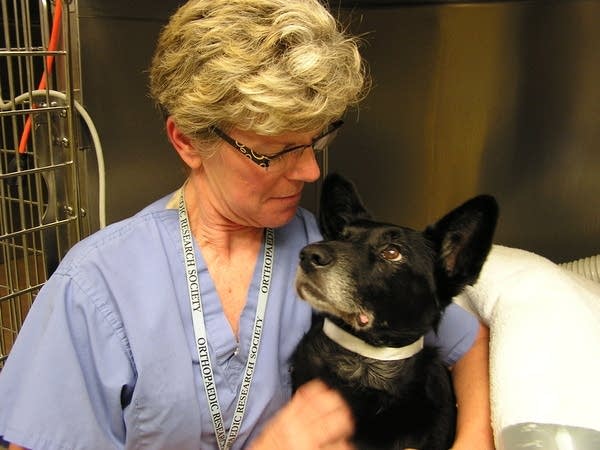U of M brain cancer test treatment shows promise

A new cancer therapy that has cured brain tumors in dogs is now being tried in human patients at the University of Minnesota.
The therapy is designed to rev up the body's immune system so it can more effectively fight cancer. Unlike chemotherapy or radiation, the university's treatment approach is intended to be non-toxic.
The clinical trial is in its early stages, so it's too early to tell whether the therapy is safe, or if it will extend survival in patients with aggressive brain cancer. But so far, researchers say they're pleased with what they're seeing.
Three years ago, a small black dog named Batman thrilled university veterinary researchers when he recovered from an aggressive brain cancer called a glioma that had threatened to kill him within a month. Gliomas form from defective cells, usually in the brain.
Create a More Connected Minnesota
MPR News is your trusted resource for the news you need. With your support, MPR News brings accessible, courageous journalism and authentic conversation to everyone - free of paywalls and barriers. Your gift makes a difference.
As one of the first dogs to benefit from the experimental anti-cancer vaccine, Batman became an instant celebrity, attracting media attention from across the globe.

Batman died in January 2010 of health complications unrelated to the brain tumor.
The success in treating Batman and other cancer-stricken dogs paved the way for today's clinical trial in humans.
Dr. Chris Moertel, clinical director of the Pediatric Brain Tumor Program at the University of Minnesota, oversees the new trial. He says the immune system therapy for people is essentially the same as it was in dogs.
"We're showing it a target. The immune system ingests and learns that target and then goes out and attacks it," he said.
The targets are brain tumor cancer cells. The body's immune system should be primed to attack these foreign invaders, but often cancer figures out a way to multiply unnoticed. In order to make the bad cells more recognizable to the immune system, researchers culled tumor cells from a donor and stripped them of their capacity to cause disease.
The director of the Neurosurgery Gene Therapy Program, John Ohlfest, helped develop the new vaccine.

"Because of the part that's recognized as foreign, the immune response reacts much more vigorously than it would otherwise," he said.
In an effort to make the vaccine even more effective, researchers modified the tumor cells so they would look like brain cancer stem cells, which tend to be most resistant to treatment. Moertel says if the immune system concentrates on eliminating these resistant cells, it should be easier to cure cancer.
"It's pulling the roots out of a dandelion, I guess. If you pull the roots out, it's more likely that dandelion won't grow back."
Seven patients have enrolled in the trial so far. Zach Mathieu, from rural New York, is patient No. 6.
The 17-year-old, who has difficulty speaking due to damage caused by his brain tumor, says the injections are no big deal compared to his previous cancer treatments back home.
"It was not chemo, and I would do anything to get away from chemo," he said.
His mother, Jennifer Mathieu, is pleased with her son's progress so far. She sees many signs of improvement since he started the clinical trial.
"It was not chemo, and I would do anything to get away from chemo."
"He seems to be getting stronger, I mean even with his walking he's been doing better. But he just seems more alert. His color's back," she said.
Zach still has tumor remnants in his brain left over from his previous surgery. But the mass hasn't grown during his treatment at the U, and Moertel says that's a very positive sign.
"I go to the computer to look at the scans and look at the results with bated breath, knowing that that tumor could come back anytime. And we've actually gotten out a ways now without any evidence of tumor activity," Moertel said. "So I'm very hopeful for Zach in the future that our vaccine might provide him some benefit."
One other patient has also maintained a stable tumor during the trial, which makes Moertel optimistic that the treatment is working.
But it's possible that the stability in these two cases could be due to chance. Two other patients have had their tumors grow during the trial. They had to quit the experiment so they could get other treatments.
Despite those setbacks, Moertel thinks his team is on the right track with its immune therapy, though he acknowledges a lot of unanswered questions remain.
"We have to find out why certain patients have success and why others don't," he said. "So again, we have miles to go before we sleep."
This fall, Moertel's team will open a new human trial that uses the vaccine therapy on another type of brain tumor.

